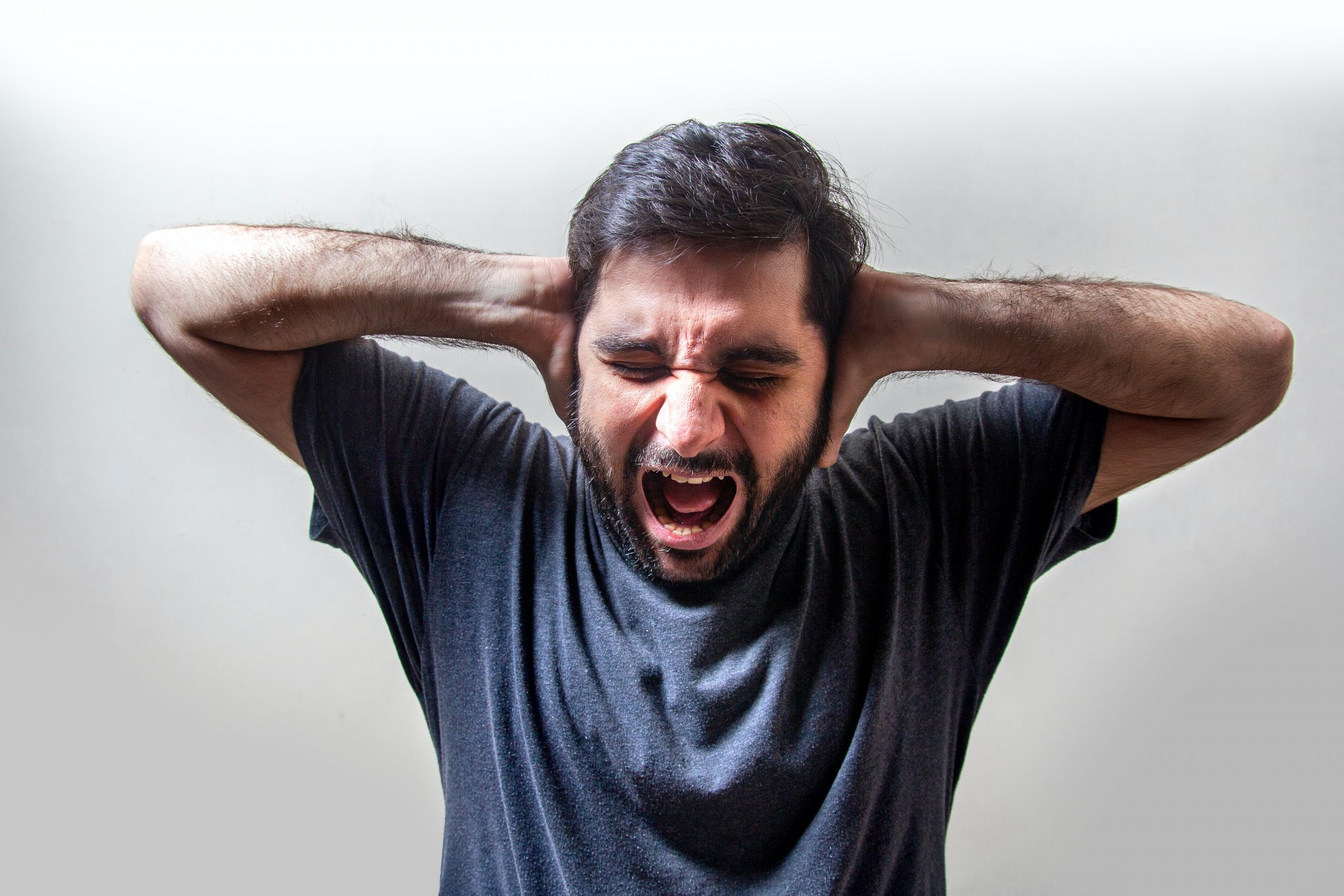We all know the feeling: you discovered a new lump, bump, or rash that has you breaking out into cold sweats. There are definitely times when you may have a concern about a health symptom, but then there are other times when your medical anxiety and hypochondria is at an all-time high.
You can tell the difference when you’re experiencing a mildly concerning bout of hypochondria versus a full-blown, full-fledged all-time high bout of hypochondria. When your medical anxiety is at this high of a level, you may actually start to experience physical sensations such as pins and needles, shortness of breath, gastrointestinal upset, hives, nausea, rapid heartbeat, heart palpitations, hyperventilation, shaking, hot flashes, dizziness, and a tight throat.
In other words, you may start to actually make yourself sick by believing that you are sick.
Trust me: we get it.
Even if you want to think about other things, chances are that you easily cannot. Why would you be able to when you may have a very serious health condition that could easily result in pain, paralysis, suffering, or death?
Please note: if you are experiencing a true medical or psychiatric emergency, please call 911.
For all other health concerns, here’s what you can do immediately to reduce your medical anxiety to a manageable level.
Journal About Your Medical Anxiety
Though it may feel counterintuitive, taking the time to journal about your symptoms and onset time length of hypochondria thoughts will help you more than you know. How?
Well, any time you journal, you’re creating a log of how you feel at that exact moment in time. Journaling can be helpful because it will allow you to see how you felt in previous moments of all-time-high hypochondria. When you have records of multiple moments, you may be able to see patterns and triggers. You may realize, for instance, that finding suspicious moles causes you to panic and feel sick to your stomach.
If, though, you can see a pattern, you may be able to also see that every single time you’ve panicked over a mole (and subsequently, felt like you were going to die from said mole) – your dermatologist has told you that it was a completely normal mole.
Now, you may be thinking that just because something hasn’t been dangerous or cancerous in the past doesn’t mean that it couldn’t be in the future.
Technically, that’s true.
Journaling isn’t meant to diagnose you or talk you out of getting help with genuine medical concerns. Rather, it’s meant to bring light to the fact that you have certain triggers and that the reason why you might have such high medical anxiety right now is because you have been triggered. Take some time, write down what you’re feeling, and go back through your old journal entries to see if you can spot any patterns.
If you do spot any patterns, note that in today’s journal entry. Not only will that help you today, but it will help you in the future if you struggle with particularly challenging bouts of health anxiety.
Avoid Googling Symptoms of Your Medical Anxiety
As tempting as it may be, you want to make sure you avoid Googling your symptoms. When you are Googling your symptoms out of health anxiety, you are already in the headspace that something is very wrong with you, medically.
Therefore, when you look at Google’s search results, all that will jump out at you is the symptoms you are experiencing in relation to awful health conditions. This is known as “Confirmation Bias.” Basically, you are subconsciously looking for any reasons to prove that your symptoms must be indicative of a serious health condition.
Do I have cancer?
How common is it for women to get cancer?
What are the symptoms of liver failure?
Just don’t do it.
You’re never going to come out of a Googling session feeling better about your symptoms. In fact, quite the opposite will happen. You will feel worse, and you will find that your health anxiety will come back with a vengeance.
But know one thing: Googling won’t change what’s happening to you. In fact, the only thing that can change what is happening to you is to go to a doctor, receive a diagnosis, and receive treatment…if there’s even anything wrong, that is.
There are a lot of steps between health anxiety and receiving treatment, and Google should not be considered any single one of those steps.
Several years ago, I went to a doctor, and he had a sign on his wall that I really liked (and that I noticed would be very helpful for hypochondriacs). It said: “Please don’t confuse your Google Searches with my medical degree.”
Harsh, but straight to the point.
The thing is, you’re not a doctor (unless you are a doctor who happens to have hypochondria, and that’s usually a very rare case) – so your Google searches are essentially useless in confirming or denying whether or not you have an actual health issue.
So, save yourself the strife, and stop hyping yourself up. It’s not worth it.
Meditate
I know; I know – another article encouraging you to meditate. If I had a dollar for every time somebody told me to meditate, I would probably have enough money to have my own personal on-call private doctor living with me at home!
Dreams aside, meditation actually is a really great way to be able to get you out of your neuroses when your health anxiety is at an all-time high. Personally, meditating and trying to “clear my thoughts” has never worked for us – especially when we’re obsessing over the fact that we have lumps on our stomach that may possibly kill us.
So, what are some other ways to meditate for those of us who have a hard time shutting off our thoughts? You can always use an app! Some of our favorite apps are:
Calm
Insight Timer
Headspace
Unplug
Simple Habit
Buddhify
Of course, if you don’t want to pay to use an app, there’s always good, old-fashioned YouTube. Click here to see our article about our 7 Favorite YouTube Meditation Videos for Hypochondriacs.
Schedule an Appointment with Your Doctor
Sometimes, just knowing that you have an appointment scheduled can be a relief. While you are still likely to worry until your appointment, it can often help knowing that you will have an answer, one way or another.
Many people find that their hypochondria is worsened when there is no plan to have their symptoms or ailments checked out. By scheduling a doctor’s appointment, there is essentially a “limit” on how long you can worry. Knowing that there is a scheduled end to your worrying can help ease your health anxiety, overall.
Also, your doctor likely will have a comprehensive medical history for you and will know your baseline. You can rest assured knowing that your doctor will be able to provide some insight into the symptoms you are experiencing.
Don’t have a doctor? Check out Zocdoc. If you don’t yet have a primary care physician or trusted doctor, check out our helpful article: How Do I Go About Finding a Primary Care Physician as a Hypochondriac?
Make an Appointment with Your Psychologist
In the same vein as the above paragraph, making an appointment with your psychologist can often lead to immediate relief, even if your appointment isn’t for a few days or weeks. The reason being?
Your brain knows that you will be able to talk to somebody, impartial, who won’t judge you for these intrusive and obsessive thoughts you have been having. Too many hypochondriacs tend to keep their health scare worries to themselves, because they are either (a) embarrassed or (b) feel like they have exhausted all of their available resources by talking to their family and friends too much.
While your psychologist likely won’t be able to advise on whether you have a genuine medical concern or not, they will be able to help advise you on how to resolve your obsessive thoughts surrounding your hypochondria. This alone should provide some relief, especially since your psychologist should know your triggers and history of health anxiety attacks.
If you don’t have a hypochondria therapist, we strongly recommend that you find one. Your health anxiety therapist will play an integral role in helping you through your rough spots when your medical anxiety is at an all-time high.
Need help finding a health anxiety therapist? Check out our article: How Do I Go About Finding a Hypochondria Therapist?
Change Your Focus From Medical Anxiety
Sometimes, simply changing your focus can be enough. While it’s hard to completely eradicate those pesky hypochondriac thoughts from your brain, you can at least distract your brain enough so that your medical anxiety won’t be so high.
Need some ideas?
Try playing a board game, reading a book, diving deep into a Netflix TV series, mastering a new recipe, painting your bedroom, going for a hike, planning a camping trip…anything that gets your thoughts off of your hypochondria.
Switch From Medical Anxiety to Medical Actions
If your health anxiety is at an all-time high, try a little bit of a paradigm shift. If you feel like you simply can’t sit idle while you wait for test results, or to see your doctor, or to get some sort of an answer…try shifting your health worries into health actions.
What does this mean?
Try converting your nervous energy into acting on your health. For example, if you’re nervous that you have a blood clot, try going for a walk or run, since both of those actions can help blood clots. If you’re worried that you have cancer, try making yourself an anti-inflammatory meal, since anti-inflammatory eating can be a great antidote to cancer.
Disclaimer: THIS WEBSITE DOES NOT PROVIDE MEDICAL ADVICE.
If you are currently experiencing medical concerns, it’s important to talk to a doctor to rule out any underlying medical conditions. HypochondriacHQ does not substitute professional medical advice or consultations with healthcare professionals. Never disregard professional medical advice or delay in seeking it because of something you have read or seen on this website.


